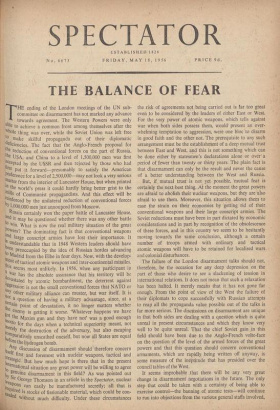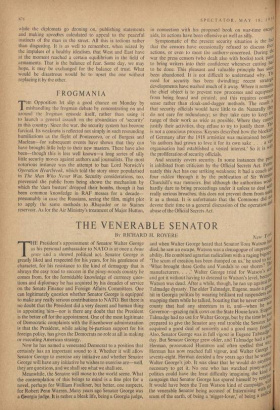THE BALANCE OF FEAR
THE ending of the London meetings of the UN sub- committee on disarmament has not marked any advance towards agreement. The Western Powers were only able to achieve a common front among themselves after the Whole thing was over, while the Soviet Union was left free to make skilful propaganda out of their diplomatic deficiencies. The fact that the Anglo-French proposal for the reduction of conventional forces on the part of Russia, the USA, and China to a level of 1,500,000 men was first Eleeepted by the USSR and then rejected by those who had lira put it forward—presumably to satisfy the American Preference for a level of 2,500,000—may not look a very serious Matter from the interior of Lancaster House, but when printed in the world's press it could hardly bring better grist to the 41,111s of Conimunist propagandists. And this effect will be reinforced by the unilateral reduction of conventional forces h°Y 1,000,000 men just annouticed from Moscow. Russia certainly won the paper battle of Lancaster House, and it may be questioned whether there was any other battle t° win. What is now the real military situation of the great Powers? The dominating fact is that conventional weapons and large conscript armies have lost their importance. It ils) understandable that in 1948 Western leaders should have , een preoccupied by the idea of Russian hordes advancing 1° Madrid from the Elbe in four days. Now, with the develop.. ent of tactical atomic weapons and inter-continental missiles, trIls seems most unlikely. In 1956, when any participant in War has the absolute assurance that his territory will be ilevastated by ' atomic bombardment, the deterrent against R -ggression is not the small conventional forces that NATO or a 1 11'nY other military alliance can muster, but war itself. It is nt e— a question of having a military advantage, since, at a thertain point of devastation, it no longer matters whether l'e enemy is getting it worse. 'Whatever happens we have Irnot the 1 ,„ Maxim .gun and they have not' was a good enough I 1 41-110 for the days when a technical superiority meant, not pr , —eLY the destruction of the adversary, but also escaping 1 b111Paratively unscathed oneself, but now all States are equal 'Lore the hydrogen bomb. ' AnY discussion of disarmament should therefore concern [ts 4 °i f first and foremost with nuclear weapons, tactical and tnrtategic. But how much hope is there that in the present to ernational situation any great power will be willing to agree b genuine disarmament in this field? As was pointed out We Sir George Thomson in an article in the Spectator, nuclear 1._ aPcms can easily be manufactured secretly; all that is 1 1 quired is stocks of fissionable material, which could be con- 'ed without much difficulty. Under these circumstances the risk of agreements not being carried out is far too great even to be considered by the leaders of either East or West. For the very power of atomic weapons, which tells against war when both sides possess them, would present an over- whelming temptation to aggression, were one bloc to disarm in good faith and the other not. The prerequisite to any such arrangement must be the establishment of a deep mutual trust between East and West, and this is not something which can be done either by statesmen's declarations alone or over a period of fewer than twenty or thirty years. The plain fact is that disarmament can only be the result and never the cause of a better understanding between the West and Russia.
But, if, mutual trust is not yet possible, 'mutual fear is certainly the next best thing. At the moment the great powers are afraid to abolish their nuclear weapons, but they are also afraid to use them. Moreover, this situation allows them to ease the strain on their economies by getting rid of their conventional weapons and their large conscript armies. The Soviet reductions must have been in part dictated by economic considerations and in part by recognition of the obsolescence of these forces, and in this country we seem to be hesitantly moving towards the same conclusion, although a certain number of troops armed with ordinary and tactical atomic weapons will have to be retained for localised wars and colonial disturbances.
The failure of the London disarmament talks should not, therefore, be the occasion for any deep depression on the part of those who desire to see a slackening of tension in international relations. It does not mean that such a relaxation' has been halted. It merely means that it has not gone far enough. From the point of view of the West the failure of their diplomats to cope successfully with Russian attempts to reap all the propaganda value possible out of the talks is far more serious. The discpssions on disarmament are unique in that both sides are dealing with a question which is quite unreal in present circumstances and which they know very well to be quite unreal. That the chief Soviet gain in this field should have been due to the Anglo-French volte-face on the question of the level of the armed forces of the great powers and that this question should concern conventional armaments, which are rapidly being written off anyway, is some measure of the ineptitude that has presided over the council tables of the West.
It seems improbable that there will be any very great change in disarmament negotiations in the future. The only step that could be taken with a certainty of being able to exercise control—the banning of atomic tests—will continue to run into objections from the various general staffs involved, while the diplomats go droning on, publishing statements and making speeohes calculated to appeal to the peaceful instincts of the man in the street. All this is tedious rather than disgusting. It is as well 'to remember, when seized by the impulses of a healthy idealism. that West and. East have at the moment reached a certain equilibrium in the field of armaments. That is the balance of fear. Some day, we may hope, it may be exchanged for the balance of trust. What would be disastrous would be to upset the one without replacing it by the other.



































 Previous page
Previous page